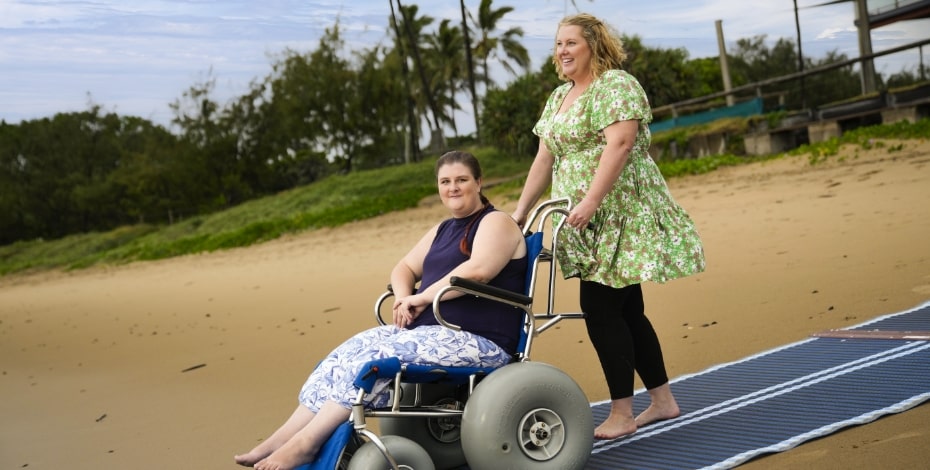
Manual handling on the beach

Sasha Job won the Physiotherapy Research Foundation Physio Pitchfest 2023 People’s Choice Award at the APA conference last October for her proposed beach accessibility manual handling training course.
Bundaberg physiotherapist and Central Queensland University PhD student Sasha Job APAM is making a name for herself as a champion for safe beach access for older people and for people with disabilities and mobility issues.
Through her research and community activities, she has been a driving force behind increasing the accessibility of beaches in Queensland and beyond and is a strong advocate of beach-based physiotherapy.
Now Sasha and her teammates Dr Steven Obst and Dr Luke Heales MACP have won the Physiotherapy Research Foundation Physio Pitchfest 2023 People’s Choice Award—worth $5000 plus a half-day mentoring session by sponsor VALD Health—to develop a beach accessibility manual handling training program.
Its aim is to overcome some of the barriers preventing the implementation of beach-based physiotherapy, including a lack of resources and professional development.
The award will provide Sasha with some of the funding needed for the development of ‘U-BEACH: Beach Accessibility Manual Handling Training’.
The project has grown out of Sasha’s research program at Central Queensland University Bundaberg, which focused on identifying the benefits of, barriers to and facilitators of beach access for people with disability and on exploring how the beach could be used as a setting for therapeutic interventions.
She received a Physiotherapy Research Foundation Seeding Grant in 2021 for this research and is in the process of analysing the data collected from online surveys and focus groups.
‘Ninety per cent of physios and occupational therapists indicated that they would like to support accessible beach initiatives and the use of the beach in a rehabilitative context but the number one barrier to them doing so was beach accessibility at a community level,’ Sasha says.
‘People don’t understand what the equipment is or how to use it safely.
‘It’s one of the biggest barriers to actually getting people onto the beach at a community level.
‘And training is another 90 per cent barrier for physios.
‘When we looked at whether physios do use the beach therapeutically, how they use the beach and what the challenges are for them in this space, the most significant barrier was a lack of training, awareness of available equipment and access to that equipment.’
Sasha’s proposed manual handling training course will address some of these barriers—in particular, the risks and challenges posed by the manual handling of clients with disabilities on the beach, the use and availability of equipment and general awareness of what’s available.
The initial course will be online and will include modules on the importance of accessible, inclusive beach access and general considerations for communicating and interacting with people with disabilities in the beach environment as well as modules about the specific use of different mobility equipment and choosing the right equipment for the client.
‘There’s massive growth in this area in terms of the assisted technology that is now available for beach access.
‘But there’s definitely a lag in people knowing what’s available and how to safely use it, which is the gap we’re trying to fill with this particular training,’ Sasha says.
‘We plan to have videos on safely rolling out onto the beach access pathway and on the use of sand wheelchairs, water wheelchairs and beach four-wheel walkers.
‘We’ll also show how to support someone who only requires physical assistance for mobility rather than an aid.
‘There will be videos demonstrating different kinds of transfers—for example, from a standard wheelchair to a beach wheelchair—so we will do hoist transfers, standing transfers and perhaps some slide transfers.’
She says that the course, which will provide a certified micro- credential in supporting safe beach access, will be of benefit to physiotherapists, occupational therapists and others who are interested in beach accessibility, including surf lifesaving and disability organisations.
Filming is underway and Sasha hopes that the course will be ready to launch midyear.
Ultimately, Sasha intends to expand the program to include face-to- face training and a model for training people to teach the program, making it more accessible around Australia.
‘We hope that the training will improve awareness of equipment and increase safety in the use of equipment, but it will also tick some continuing professional development boxes and reduce liability, which is an organisational concern in this space,’ she says.
There’s a growing market for disability-adapted equipment and activities including surfing, paddleboarding and kayaking.
‘We’ve found there is a significant demand, not only for the equipment but for the services to support beach access as well.
‘Our research with surf lifesaving has shown that a high proportion of surf lifesavers have disability experience outside of surf lifesaving organisations.
‘It’s important to recognise that because you know there’s a lot of interest and drive among surf lifesavers to be involved,’ Sasha says.
>> The 2023 PRF Physio Pitchfest was proudly sponsored by VALD Health (valdhealth.com).
© Copyright 2025 by Australian Physiotherapy Association. All rights reserved.





